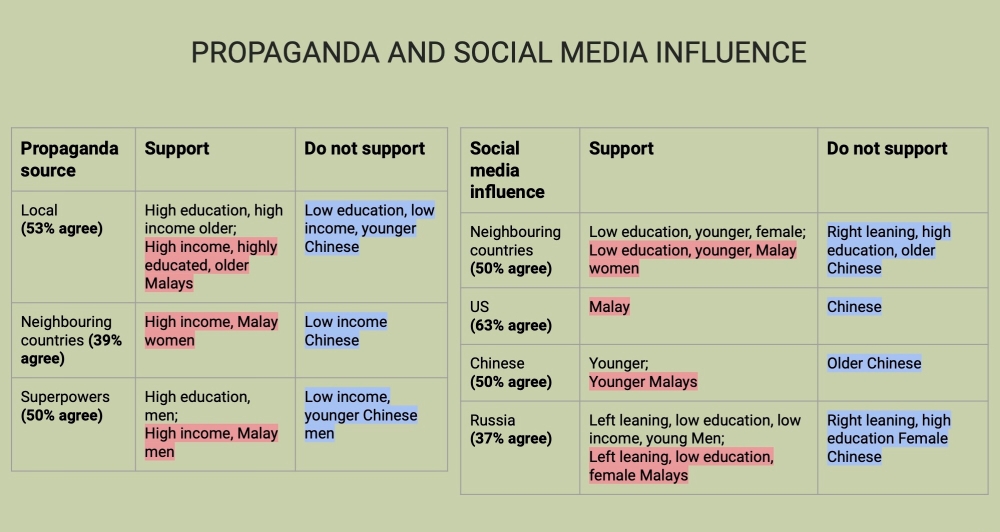- Malaysians tend to favour China and Russia more compared with the United States, with Malay men preferring Russia
- The Chinese community showed pronounced preference for China, often believing that superpowers exert minimal influence over Malaysian socia media or engage in propaganda campaigns
- The Chinese community thought Putrajaya should do more on South China Sea, and felt the Uyghurs have been unjustly detained
- Malays tend to agree that the three superpowers are influencing local social media, but the Chinese disagreed
KUALA LUMPUR, June 15 — A bigger proportion of Malaysians are in favour of superpowers China and Russia compared to their rival United States, a recent report by Taylor's University, analytical consulting firm Chasseur Group and Canadian-based think tank Digital Public Square has highlighted.
Those who supported Beijing tend to be men who are older or from the Chinese community while Malay men tend to favour the Kremlin, according to the report titled “Trust in Media and the Government: An Analysis of Superpower Influence”.
“There is a decline with the United State’s image especially with the older Malays, for obvious reasons,” Chasseur Group executive director Munira Mustaffa said while presenting the report’s findings earlier this week, referring to Washington's foreign policy — especially its stance on Israel's occupation of Palestine.
“There’s a perception that Russia offers a counterbalance to the United States’ hegemony,” she added.
In the same presentation, director for Taylor's University's Peace, Justice and Strong Institutions Impact Lab, Benjamin YH Loh, however noted that since the survey was conducted in November last year, Israel's retaliation against Gaza for Hamas' attack the previous month might have increased anti-American sentiments amongst Malaysians.
The survey found the percentage of respondents who favoured the superpowers as below:
- US — 41 per cent
- China — 57 per cent
- Russia — 54 per cent
When it comes to propaganda from superpowers influencing opinions in the country, the respondents were divided: highly-educated men and high-income (earning above RM5,000 monthly) Malay men agreed with this sentiment, while low-income men or younger ethnic Chinese men disagreed.
Loh said that though “propaganda” was not defined in the survey, it generally refers to political information influencing operations.
He added that propaganda in social media also included the use of individuals paid to disseminate political propaganda on social media, commonly known locally as “cybertroopers”.

“We thought that was quite interesting because, in terms of Russia, that is probably the country that has the most documented evidence of having sort of like doing international interference not just in Malaysia, but around the world as well,” Loh said.
The survey also found that foreign state media found little purchase here, such as China's CGTN and CRI (6 per cent each), or Russia's Sputnik (4 per cent).
While those who used the Chinese outlets tend to be ethnic Chinese with low education, those who consume Sputnik tend to be from the Indian community.
Other findings included:
- A whopping 87 per cent of respondents agreed that the Malaysian government should be doing more to protect our interests in the South China Sea — these tend to be from the Chinese community.
- Less than half (47 per cent) agreed that the Uyghur and other Muslim minorities have been unjustly detained in China's Xinjiang region — similarly those who supported this tend to be Chinese.
- A mere 19 per cent agreed that Russian military action in Ukraine is understandable. Those who backed this sentiment tend to be Malays of leftist leaning or of low education.
A survey was commissioned by Digital Public Square and was conducted in November last year by data and insights company TGM Research.
A total of 1,537 respondents were reported, broken down to Malays (953), ethnic Chinese (353) and ethnic Indians (72).
The result of the survey was then analysed by Taylor's University and Chasseur Group, resulting in the report.
The findings mirrored those released by Washington-based Pew Research Center earlier this week:
- More Malaysians believe in Russian President Vladimir Putin and his Chinese counterpart Xi Jinping on global affairs
- Around 84 per cent of Malaysians disapproved of US President Joe Biden’s handling of the conflict between Israel and Hamas
- Similarly, Malaysia also ranked third in having an unfavourable view of the US — with 65 per cent of respondents giving the superpower poor marks
This article is part of a series of stories based on the “Trust in Media and the Government: An Analysis of Superpower Influence” report. To read other articles:
- What does it take for Malaysians to care more about local issues? Being Malay and well-off for a start, report suggests
- Local media's income problem: Those who trust and share news tend to be high-earners, survey suggests
Read Benjamin Loh and Munira Mustaffa's opinion piece on the importance of their study.
Malay Mail is a member of Internews' Indo-Pacific Media Resilience programme, working to tackle foreign information manipulation and interference into local democracy.



















